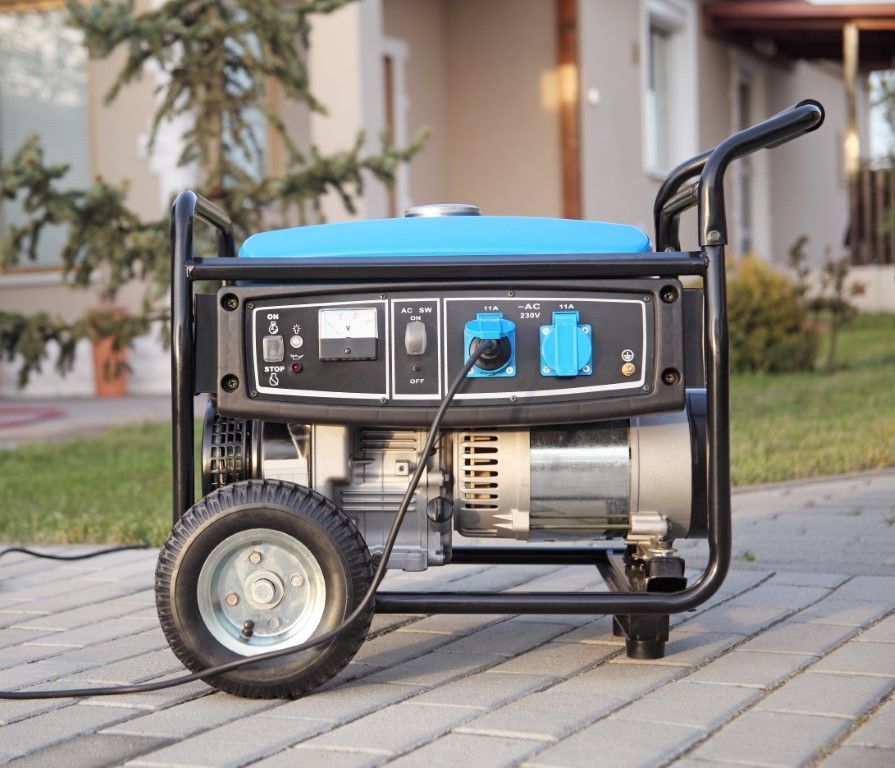
Electric Generators in Norfolk VA
An electric generator is a device that converts mechanical energy into electrical energy. Its main purpose is to provide a backup power source during outages or when a reliable power supply is not available. Generators are essential for ensuring that homes, businesses, and other facilities can continue operating during power interruptions caused by storms, equipment failure, or other issues.
Types and Key Features to Consider
There are several types of electric generators, each suited for different needs. The main categories include portable generators, standby generators, and inverter generators.
- Portable Generators: These are versatile and can be moved from one location to another. They are typically used for temporary power needs, such as during camping trips or outdoor events.
- Standby Generators: These are permanently installed and connected to the electrical system of a building. They automatically turn on during a power outage and are ideal for providing continuous power to homes and businesses.
- Inverter Generators: Known for their quiet operation and efficiency, inverter generators are often used for sensitive electronics. They produce clean, stable power that is safe for delicate devices.
When choosing a generator, consider its power output, fuel type (gasoline, diesel, or propane), and noise level. It's also important to assess how easily it can be maintained and whether it meets the specific power requirements of your application.

We will get back to you as soon as possible.
Please try again later.
How It Works
Electric generators operate based on the principle of electromagnetic induction. They consist of two main components: a rotor (the rotating part) and a stator (the stationary part). The rotor, powered by an engine, turns within the stator. As it spins, it generates a magnetic field that induces an electrical current in the stator's windings. This current is then converted into usable electricity and supplied to your home or business.
Uses and Importance
Electric generators are crucial for various applications. In residential settings, they ensure that essential appliances like refrigerators, heating systems, and medical equipment remain operational during outages. For businesses, generators prevent downtime and loss of productivity by maintaining power to critical operations. Additionally, generators are used in construction sites, outdoor events, and areas where the electrical grid is unreliable.
The importance of having a reliable generator cannot be overstated. It provides peace of mind, ensuring that you are prepared for unexpected power disruptions and can continue your activities without interruption.
Maintenance and Safety Tips
Regular maintenance is vital to keep your generator running smoothly. Here are some key tips:
- Routine Inspections: Check the generator periodically for signs of wear or damage. Inspect fuel lines, filters, and connections.
- Oil Changes: Change the oil regularly, as recommended by the manufacturer, to keep the engine running efficiently.
- Battery Care: Ensure the battery is in good condition and fully charged. Replace it as needed.
- Clean and Store: Keep the generator clean and store it in a dry, protected area when not in use.
Safety is also paramount. Always operate the generator outdoors to prevent carbon monoxide buildup. Use proper extension cords and follow the manufacturer's instructions to avoid electrical hazards.
Environmental Considerations
Generators can have environmental impacts, particularly concerning emissions. Diesel and gasoline generators produce pollutants that can affect air quality. To mitigate this, consider investing in models with lower emissions or those that use cleaner fuels, such as propane. Additionally, regular maintenance helps reduce the environmental footprint of your generator by ensuring it operates efficiently.
Common Misconceptions
One common misconception is that all generators are equally loud. In reality, noise levels vary significantly between models. Inverter generators, for example, are designed to be much quieter than traditional models. Another misconception is that generators are only useful for emergencies. In fact, they can be valuable for everyday power needs in areas with unreliable electricity. Another myth is that generators require complex maintenance. While they do need regular care, the process is straightforward and manageable with a bit of attention to detail.
If you need more information about
electric generators in Norfolk, VA, or if you're ready to choose the right generator for your needs, don't hesitate to get in touch. Our team is here to help you find the best solution, provide expert advice, and ensure you have a reliable power source for any situation. Contact us today to learn more about our products and services.
How to Prepare Your Electric Generator for Seasonal Changes and Extreme Weather
Electric generators are crucial for maintaining power during outages, especially when seasonal changes and extreme weather hit. Preparing your generator for these conditions ensures it operates smoothly and reliably when you need it the most. In this guide, we'll walk you through essential steps to get your generator ready for the changing seasons and extreme weather conditions.

Inspect and Clean the Generator
Begin by performing a thorough inspection of your generator. Check for any signs of wear or damage, such as cracked hoses, loose connections, or rust. Clean the generator to remove dirt, debris, and dust that might have accumulated. This will help prevent overheating and ensure that the generator runs efficiently. For best results, use a dry cloth to wipe down the exterior and a vacuum to clean around the air intake and exhaust areas.
Change the Oil and Fuel
Regularly changing the oil is crucial for maintaining the performance of your generator. Refer to the manufacturer’s recommendations for oil change intervals and use the recommended type and grade of oil. Similarly, inspect the fuel system and replace old or contaminated fuel. If your generator uses gasoline, store it in a cool, dry place and use a fuel stabilizer to prevent it from degrading. For diesel generators, ensure the fuel tank is full to prevent condensation and potential fuel contamination.
Replace Air and Fuel Filters
Air and fuel filters play a vital role in the efficient operation of your generator. Clogged filters can reduce performance and lead to engine problems. Check the condition of both filters and replace them if they are dirty or clogged. Air filters should be replaced more frequently in dusty or high-pollen environments, while fuel filters should be changed based on the manufacturer's recommendations.
Test the Battery
The battery is an essential component of your generator’s starting system. Check the battery’s charge and condition, and clean any corrosion from the terminals. If the battery is weak or old, consider replacing it to ensure reliable starts. Test the generator periodically to confirm that the battery and charging system are working correctly.
Inspect the Exhaust System
The exhaust system must be free from leaks and blockages to ensure safe and efficient operation. Inspect the exhaust pipes and connections for signs of damage or rust. Ensure that the exhaust is directed away from any structures or flammable materials. In cold weather, check for any ice or snow accumulation that could obstruct the exhaust flow.
Prepare for Extreme Weather
Extreme weather conditions, such as heavy snow, ice storms, or intense heat, can impact your generator's performance. For winter weather, ensure the generator is protected from snow and ice by using a weatherproof cover. In summer, keep the generator shaded to prevent overheating. Additionally, make sure the generator’s fuel supply is adequate and stored in a safe location.
Schedule Regular Maintenance
Regular maintenance is key to keeping your generator in top condition. Follow the manufacturer’s maintenance schedule and consider having a professional service technician perform a thorough checkup. Regular maintenance will help identify potential issues before they become major problems and ensure that your generator is ready when you need it.
Create a Backup Plan
Even with proper preparation, it’s wise to have a backup plan. Ensure you have extra fuel stored safely and a means of contacting a service technician if needed. Keep a maintenance log to track the condition of your generator and any work performed.
Preparing your electric generator for seasonal changes and extreme weather is crucial for its reliable operation. If you need assistance with inspection, maintenance, or repairs, our team of experts is here to help. Contact us today to schedule a service or get more information on keeping your generator in top shape for any weather condition. Don’t wait until an emergency hits—ensure your generator is ready for action now.
Common Problems with Electric Generators and How to Fix Them
Electric generators are vital for maintaining power during outages, running essential equipment, and supporting various needs in both residential and commercial settings. However, like any mechanical system, generators can experience problems. Understanding common issues and knowing how to address them can help ensure your generator operates efficiently and reliably. This guide outlines frequent generator problems and provides practical solutions to keep your equipment in top shape.
Generator Fails to Start
One of the most common issues is a generator that won’t start. This problem can stem from several factors, including:
- Fuel Issues: Ensure the generator has enough fuel. Check for fuel leaks or old fuel that may have gone stale. Replace old fuel and use fresh, clean fuel.
- Battery Problems: A dead or weak battery can prevent the generator from starting. Test the battery and replace it if necessary. Ensure that battery terminals are clean and securely connected.
- Oil Levels: Low oil levels can trigger a shutdown to protect the engine. Check the oil level and top up if needed. Regularly check and change the oil as part of routine maintenance.
Generator Runs but Fails to Produce Power
If your generator starts but doesn’t supply power, the issue could be due to:
- Circuit Breaker Trip: A tripped circuit breaker can stop power flow. Inspect the breaker panel and reset any tripped breakers. If the breaker trips again, consult a professional to check for underlying issues.
- Load Issues: Make sure the load connected to the generator does not exceed its capacity. Overloading can cause the generator to stop producing power. Disconnect some devices and try again.
Unusual Noises
Generators may produce strange sounds if there is an issue. Common causes include:
- Loose Parts: Vibration from loose parts can cause rattling or knocking noises. Inspect the generator for loose bolts or components and tighten them as needed.
- Exhaust Problems: A damaged or loose exhaust can produce unusual noises. Check the exhaust system for any leaks or damage and repair or replace parts as necessary.
Smoke or Burning Smell
Smoke or a burning smell indicates a serious problem. Possible causes include:
- Overheating: Ensure the generator is not running in an enclosed space that prevents proper ventilation. Check the cooling system and clean any air filters or vents to prevent overheating.
- Oil Leakage: Leaking oil can cause smoke and potential fire hazards. Inspect for oil leaks and address them immediately. Regular maintenance can help prevent oil-related issues.
Difficulty in Starting in Cold Weather
Generators might struggle to start in colder temperatures. Solutions include:
- Use Winter-Grade Oil: Cold temperatures can thicken standard oil, making it harder for the engine to start. Switch to winter-grade oil that remains fluid in low temperatures.
- Keep the Generator Warm: Store the generator in a warmer location or use a generator cover designed to protect it from the cold.
Error Codes or Warning Lights
Modern generators often have diagnostic systems that display error codes or warning lights. Address these by:
- Consulting the Manual: Refer to the user manual for specific error codes and troubleshooting steps.
- Seeking Professional Help: If the issue is not resolved through basic troubleshooting, contact a professional for a thorough inspection and repair.
Maintaining a reliable generator requires attention to common issues and prompt repairs. If you encounter persistent problems or need expert assistance, don’t hesitate to reach out to our team. Our experienced technicians are ready to diagnose and resolve any generator issues to ensure you have uninterrupted power when you need it most. Contact us today to schedule a service or consultation.
Let's Connect!
Are you tired of worrying about power outages? Look no further than us. Our experienced team is dedicated to providing reliable and efficient generator installation and maintenance services. With a generator from us, you can rest easy knowing that your home or business will stay powered during unexpected outages. Don't wait until the next storm hits - hire us today and enjoy the peace of mind that comes with reliable backup power!